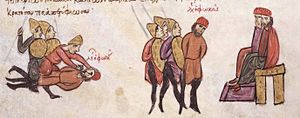
Back Mac'hagnadur politikel en Impalaeriezh Bizantion Breton Mutilació política a l'Imperi Romà d'Orient Catalan Mutilación en el Imperio bizantino Spanish مثله کردن سیاسی در فرهنگ بیزانس Persian Mutilation politique dans la culture byzantine French Mutilazioni politiche nella cultura bizantina Italian Mutilação política na cultura bizantina Portuguese Нанесение увечий по политическим причинам в Византии Russian Bizans kültüründe politik nedenlerle sakat bırakma Turkish

Mutilation was a common method of punishment for criminals in the Byzantine Empire, but it also had a role in the empire's political life.[1] By blinding a rival, one would not only restrict his mobility but also make it almost impossible for him to lead an army into battle, then an important part of taking control of the empire. Castration was also used to eliminate potential opponents. In the Byzantine Empire, for a man to be castrated meant that he was no longer a man—half-dead, "life that was half death".[2] Castration also eliminated any chance of heirs being born to threaten either the emperor's or the emperor's children's place at the throne. Other mutilations were the severing of the nose (rhinotomy), or the amputating of limbs.
- ^ Rautman 2006, p. 30
- ^ Ringrose 2003, p. 62
© MMXXIII Rich X Search. We shall prevail. All rights reserved. Rich X Search